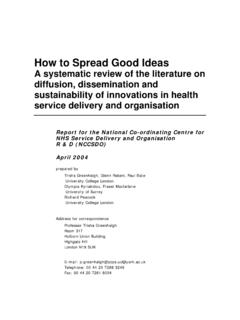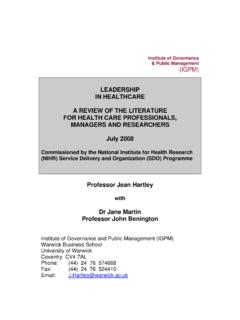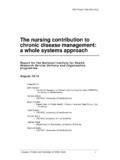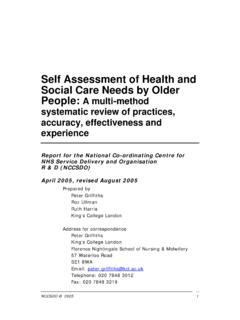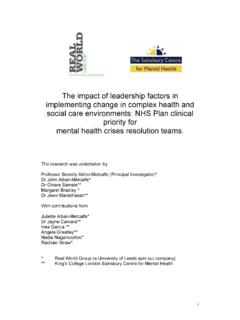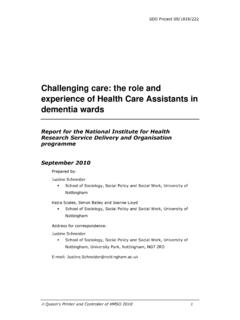Transcription of Organisational Change - netscc.ac.uk
1 OrganisationalChangeA REVIEW FOR HEALTH CARE MANAGERS, PROFESSIONALS AND RESEARCHERSM anagingChangein the NHSV alerie Iles and Kim SutherlandManagingChangein the NHSO rganisationalChangeA REVIEW FOR HEALTH CARE MANAGERS, PROFESSIONALS AND RESEARCHERSV alerie Iles and Kim SutherlandContentsPurpose and does the literature come from? kind of evidence does it provide? is meant by Change ? Change in the to access the can we understand complexity, 25interdependence and fragmentation?Weisbord s Six-Box Organisational Model257S Model27 PESTELI29 Five Whys30 Content, Context and Process Model32 Soft Systems Methodology34 Process modelling36 Process flow37 Influence diagram38 Theory of Constraints (TOC) do we need to Change ?
2 40 SWOT and what can Change ?42 Force field analysis43 Sources and potency of forces 45 Readiness and capability 46 Commitment, enrolment and compliance47 Organisation-level Change interventions48 Total Quality Management (TQM)48 Business Process Reengineering (BPR)50 Group-level Change interventions54 Parallel learning structures54 Self-managed teams55 Individual-level Change interventions56 Innovation research56 Securing individual behaviour change58 Part 1 The literature on changemanagementPart 2 Tools, models and approaches.
3 A selective reviewManagingChangein the NHSPart 3 Reflections on can we make Change happen?60 Organisational development (OD)60 Organisational learning and the Learning Organisation63 Action research66 Project with using available an evidence evidence for local for future research79 Appendix 1 Search strategy84 Appendix 2 Summary of empirical 85research on effectiveness of Change models in health care organisations 1990 1999 Appendix 3 What is systems thinking? 89 Appendix 4 Development of a Change 91management resourceAppendix 5 Participants at the Change 92management workshop and seminar94 Purpose of this reviewThis review aims to provide a resource and reference tool to help readers findtheir way around the literature on Change management and consider theevidence available about different approaches to Iles, Really Learning and London School of Hygiene & Tropical Medicine, University of LondonKim Sutherland, Judge Institute of Management Studies.
4 University of CambridgeProject sponsorsMaureen Dalziel, Director NCCSDON aomi Fulop, Deputy Director NCCSDOP rofessor Sir John Pattison, Director, NHS SDO R & D ProgrammeSteering groupMaureen Dalziel, NCCSDO (Chair)Sandra Dawson, Judge Institute of Management Studies, University of CambridgeEwan Ferlie, Management School, Imperial College of Science, Technology and Medicine, University of LondonNaomi Fulop, NCCSDOV alerie Iles, Really Learning and London School of Hygiene & Tropical Medicine,University of LondonProject management (NCCSDO)Helena Ward, Gr inne Kavanagh and Pamela TimmsProject communication and editorial consultantsMarsaili Cameron, Steve Cranfield (managing editor Review)
5 , Margaret Mellor and Jud Stone. Design by copiesKate Thomas, Co-ordinatorNCCSDOL ondon School of Hygiene & Tropical Medicine99 Gower StreetLondon WC1E 6 AZTel: +44 (0) 20 7612 7980 Fax: + 44 (0) 20 7612 7979 Email: of issue: May 20015 ManagingChangein the NHSA cknowledgementsPeer reviewersHuw Davies, Reader in Healthcare Policy and Management, Department of Management, University of St AndrewsNigel Edwards, Policy Director, The NHS Confederation Pam Garside, Management Consultant, NewhealthLaurie McMahon, Executive Director for Professional Practice, Office of Public Management Annabel Scarfe, Head of Organisation Development.
6 NHS Executive London RegionWe are grateful to the large number of people who contributed to the nationallistening exercise conducted by the NCCSDO in autumn 1999; and also to thosewho attended the Change Management and Quality Improvement workshop(4 April 2000) and the seminar Managing Change in the NHS (12 July 2000).See Appendix 5 for lists of participants at the workshop and are grateful to the following for their kind permission to use quoted andcopyright material:Jossey-Bass Inc. (Figure 1); Perseus Books (Figure 3); Sage Publications Ltd.
7 (Figure 5); John Wiley & Sons Ltd (Figure 6); Kate Grimes, King s College Hospital( Transforming Healthcare Delivery , Improving referral processes , andFigure 7);Addison-Wesley (Table 2); Andrew Paterson, Enfield Community Care NHS Trust(Figure 10).Every effort has been made to identify and contact copyright owners. The publishers would be pleased to hear from anyone whose rights have beenunwittingly document was commissioned and funded by the SDO R & D Programme,a national research programme managed by the National Co-ordinating Centrefor NHS Service Delivery and Organisation under contract from the NHSE R & need for Change in the health service is now widely recognised by public,by professions and by government.
8 The NHS Plan, issued last year, requires afundamental Change in thinking, practice and delivery of health care over thenext challenges for those working towards meeting the Plan s ambitious changeagenda are clear. We know that practising managers and professionals arekeen to meet these challenges, to improve services by learning from theresearch literature and to base their decisions in evidence where possible. Many people in the NHS, however, are not familiar with the thinking aboutmanagement of Change which has come out of schools of management,psychology, sociology, and economics, over the last fifty years.
9 Many who areaware of some of the concepts do not appreciate the contexts in which theywere developed, nor the purposes to which they may be put in the process ofmanaging Change . Important insights and guidance which the literature offersare thus not being used to maximum document is one of two SDO publications on Change management thesecond is a booklet summarising key lessons designed with the needs ofdifferent audiences in mind but with the single aim of helping people to bridgethis gap between the commitment to Change and action.
10 Drawing uponexpertise from the Judge Institute of Management Studies, University ofCambridge, and benefiting from the advice of other academic colleagues, andcolleagues in the NHS and other sectors, we have produced in this publicationwhat we hope is a succinct and user-friendly review of the literature andevidence on Change that the whole NHS can draw trust that significant lessons for Change will be drawn from this review andits sister publication and that they will stimulate further debate and inquiry in thisimportant Sir John PattisonDirectorNHS SDO R & D ProgrammeForeword7 ManagingChangein the NHSI ntroductionBackgroundIn the White Paper, A First Class Service(DOH, 1998)
